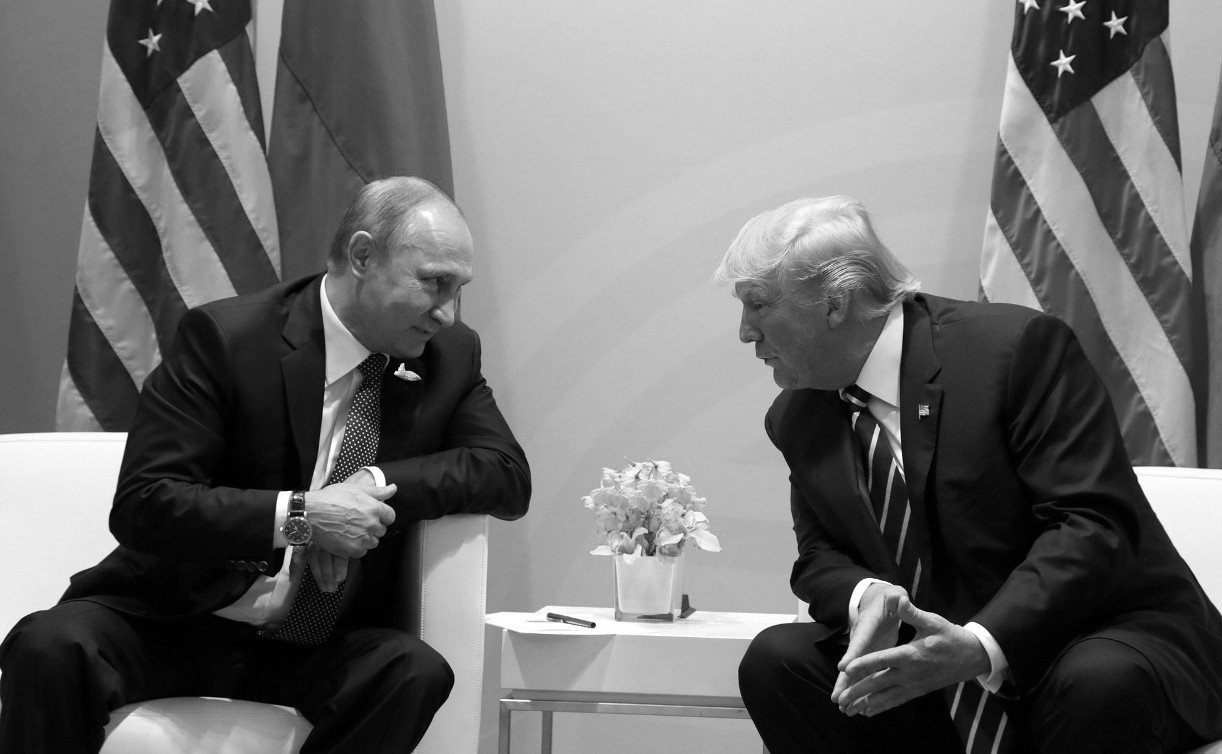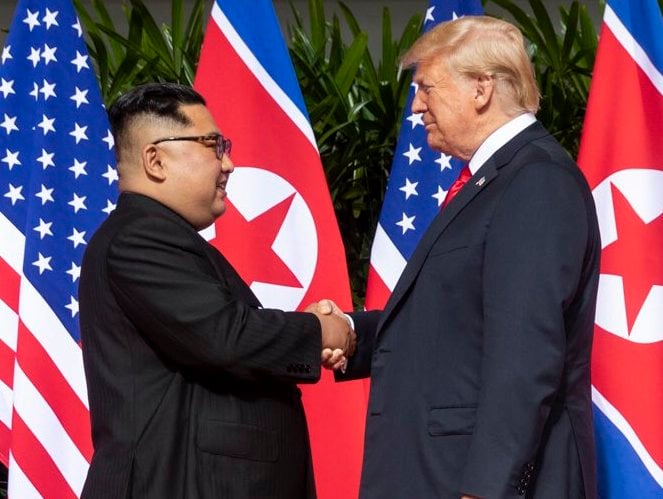A couple of weeks after Trump visibly shoved aside Montenegrin President, Dusčo Marković, at a Nato conference last spring, Russian agents simply tried to get rid of him altogether.
Just before a scheduled vote on joining Nato, a Serbian cabal staged a failed coup and assassination attempt against Marković, for which two Russian agents would later be prosecuted in absentia. Soon thereafter, Montenegro’s parliament voted unanimously to join Nato, with Russian allied Serbs boycotting the vote.
Whether Trump’s shove was just another attack of narcissism or part of a more concerted attack on Nato is debatable.
But Trump would more recently go on to note that it made no sense for Nato to come to the defense of a tiny country like Montenegro, which most people could not even locate on a map. Yet, if Russia attempts another coup in Montenegro and Nato does nothing, it will empower them to do the same in the Baltic states of Latvia, Lithuania, and Estonia, where prosperous democracies arose after the fall of the Soviet Union.
There are consequences to Trump’s praise for dictators like Putin and Kim Jong Un, with the most important being that it signals they can do what they please, and what all too many dictators want is to take over weak and defenseless democracies like Montenegro.
It is all reminiscent of cold war politics, but this time, the American president is not working against but rather with his autocratic counterparts in Moscow.
And the American allies under threat are not semi-liberal authoritarians in obscure places but electoral democracies, where citizens have become accustomed to speaking their minds and enjoying the fruits of freedom—and they are often located in the heart of Europe.
The Baltic states are members of the European Union, so attacking them without consequence would render Nato moot. But if Nato falls, the EU might as well. For in the absence of a common means of defense, many will side with the most powerful state in the region, which is altogether hostile to a united Europe.
And while an attack on a European state may seem unlikely, it has actually already happened, with the world’s first cyber-war being carried out against Estonia in 2008. It was the first of many Russian attacks on sovereign democracies, with the attacks striking ever closer to home until they hit at the heart of American sovereignty itself.
But what woke American liberals like a shot in the night had been happening elsewhere for almost a decade.
Following the attack on Estonia, Putin launched a war in the former Soviet state of Georgia, which had since turned democratic, where he carved out a small Russian enclave in 2009. Undeterred, he sent masked troops into the Crimea in 2014, where a minuscule Russian-allied party passed an illegal and flawed referendum breaking away from the increasingly democratic Ukraine. Shortly thereafter, Putin sent troops into Russian-speaking parts of Ukraine in a bid to further break up and destabilize the state.
But he went further still, with a now familiar pattern of abuses.
Bots, trolls, dummy sites, and fakes news stories fueled the British campaign to leave Europe in 2016, which was recently revealed to have been largely funded by a Russian oligarch.
The pattern was then replicated in America, France, and Germany, where Russia-funded right wing nationalists shared the same goal of breaking up an increasingly fragile alliance of democracies.
There are many on the left who argue that American electoral interference was deserved, because we have done the same to other states. But Montenegro and Ukraine suffered the same fate without doing anything of the sort. And the idea that Americans deserved it, when many opposed their state’s worst abuses of power, is an unjust form of collective punishment.
Hating your country for the wrongs it has committed may or may not be justified, but wishing to destroy it through a hateful idiot is hateful and idiotic.
Yet, as it turns out, the United States has not backed a coup against a democratically elected government since 1973, when it helped overthrow Chile’s Allende. The coup was orchestrated by an aggressive and corrupt Nixon administration, and fairly neutral observers believe Chilean democracy was on its last legs, as members of Allende’s party were pressing him to dissolve parliament. It was the third time America overthrew a democratically elected government, the first being Iran in 1953, and the second Guatemala in 1954, with both occurring amid fears they would ally with Moscow, thereby compromising their democratic institutions anyway.
The U.S. has meddled in elections on numerous occasions since that time. But it has usually involved an effort to preserve democratic institutions through keeping antidemocratic parties out of power.
American interference in the affairs of other countries since the cold war has mostly been against brutal autocracies, likes those of Saddam Hussein, the Taliban, Milosevic, and Qaddafi, after his United Nations team warned he was about to commit genocide against protesters.
America has used force recklessly on numerous occasions, though. The arms and logistical support we are now providing to the Saudis in their effort to starve millions through a crippling blockade is arguably genocidal. And the pressure placed on poor states to adopt neoliberal economic policies in the 90s was poorly conceived and hazardous.
Yet, America maintains closer relationships with democracies and usually supports democratization, for democratic alliances tend to be more peaceful and prosperous. Many political scientists argue no two stable democracies have ever gone to war with one another in the modern era. This is largely because of the sentimental identification the citizens of such states feel for one another. This is fostered through higher levels of travel and trade, but also shared norms and values. Political leaders share these same affinities, leading to massive strain in alliances with autocrats.
However, America did not possess the luxury of forging alliances on shared values alone until the end of the cold war. At that time, the world saw a renaissance in democratization.
According to Larry Diamond, perhaps the world’s foremost expert on democratization, no less than 40 democracies arose between 1990 and 1994, as Russian support for autocrats dried up. With barely a shot fired, America and its European partners aided in the democratization of several dozen states through diplomatic pressure, financial incentives, administrative support, peacekeeping operations, and preferential access to international institutions.
It was a largely silent revolution, but as Soviet power evaporated, America was transformed into the sole global hegemon, and to the mind of many, a threat to world peace.
This perception was only reinforced when the Bush administration tried to build democracy at the barrel of a gun in Iraq, thereby sullying the very notion of democratization itself. Many of the democracies built in the 90s also began to falter around this same time.
Building democracies takes hard work, and it requires the right set of values, many of which were lacking in these states. Hence, they were soon beset by corruption, as citizens lost faith in democracy itself.
Democratic freedoms can be a burden that many seek to throw off, all the more so when globalization in a complex world increases the challenge involved in thinking for oneself. Hence, demagogues soon arose to “drain the swamp,” in one nation after another, when what they were really promising was an end to freedom.

Trump has now praised a number of these dictators.
He has told Roderigo Duterte of the Philippines that he is doing a great job. Yet, Duterte has compared himself to Hitler, saying he would be happy to slaughter his country’s three million drug users.
He has praised Saddam’s efficient killing of terrorists, though most of the citizens he slaughtered were not terrorists but rather the minority Kurds whom he gassed.
He celebrated Xi Xinping’s maneuver to make himself president for life in China, saying he thought it was a great move, in spite of Xi’s effort to revive Mao’s cult of personality.
And of course, his flattery of Putin has been endless, while his attacks on virtually every major democratic ally have been withering.
But if America, and the international institutions it helped build, played a significant role in the rise of a democratic world era, the withdrawal of American support will mean many simply collapse.
Smaller democracies will perceive themselves as increasingly vulnerable; hence, movements will arise to ally with more powerful states like Russia and China, which will favor dictators over electorates. Newer democracies will see the incentives America used to bring stability to their institutions dry up and disappear. And international organizations once dominated by democracies, which incentivized human rights protections and fair elections, will be weakened in favor of those dominated by autocrats.
In the end, Trump’s tenure in office could spell the end to as many democracies as were built in the early 90s, and the deaths they die may be just as quiet as their births. A more likely result is that most states will simply see a weakening of their democratic institutions, with perhaps a dozen aspiring democracies failing completely.
Real people suffer when democracies die: just consider the fate of America itself.
But the fate of countless democracies is now intimately tied to the fate of American democracy. For when American support dries up, all too many smaller democracies will be left exposed to the whims of greater powers, like Montenegro and Estonia. Trump’s praise for dictators is simply an announcement that they can do what they please, and what all too many of them want is to expand their territories. But his praise also elevates their status in the eyes of their compatriots and the world.
Hence, the midterm elections will be critical not only to the fate of American democracy, but democracy itself. And keeping informed, sharing articles, giving money, and campaigning are more important now than ever.
~
If you liked this article, please check out my latest book, The Holocausts We All Deny.
~







Read 0 comments and reply